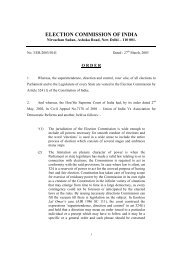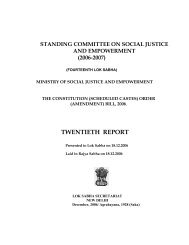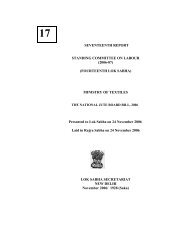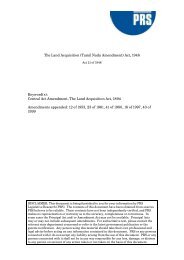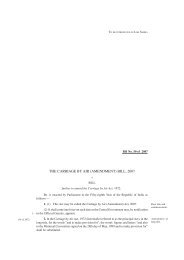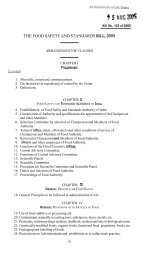Report of the Tiger Task Force - PRS
Report of the Tiger Task Force - PRS
Report of the Tiger Task Force - PRS
Create successful ePaper yourself
Turn your PDF publications into a flip-book with our unique Google optimized e-Paper software.
TIGER TASK FORCE REPORT JOINING THE DOTS ■benefiting from <strong>the</strong> forest, and who are bearing <strong>the</strong>costs <strong>of</strong> conservation.Not a ‘one-size fits all’ approachOver 300 PES (payments for environmental services)systems have been inventoried in <strong>the</strong> world. Eachmodel is distinct and appropriate for specificcircumstances in order to calculate <strong>the</strong> costs and topass <strong>the</strong>m to <strong>the</strong> right owner. PES is applicable, but itis not a monolith. India’s approach too needs to beappropriate and tailored to each forest and situationon <strong>the</strong> ground. The main peculiarity in India is that<strong>the</strong> poorest people in forests have no land rights.Since many PES systems link land use to <strong>the</strong>provision <strong>of</strong> services — payments are based on clearland rights — its application without a land rightsregime for those who protect forests could createmore alienation.Incentives do not have to be land-based,however, nor do <strong>the</strong>y have to be cash payments: thishas been demonstrated in <strong>the</strong> village <strong>of</strong> Sukhomajriin Haryana, where water rights were de-linked fromland. The pani panchayats in Maharashtra also workthis way. Such innovative approaches to expandrights, including rights to environmental benefits, areneeded.It is clear that conservation support in India willneed innovative approaches. The fact is that we haveto make conservation ‘pay’ so that <strong>the</strong> burden on <strong>the</strong>poor is reduced. It is <strong>the</strong>y who live within <strong>the</strong>conservation areas; it is <strong>the</strong>y who are deprived <strong>of</strong>development and livelihood opportunities.RecommendationsThe <strong>Tiger</strong> <strong>Task</strong> <strong>Force</strong> recommends that <strong>the</strong> Project <strong>Tiger</strong> directorate must take urgentinitiative to begin a definite and time-bound programme for payment <strong>of</strong> ecologicalservices to stakeholders.To do so, it must work with <strong>the</strong> tiger reserves to carry out an evaluation <strong>of</strong> <strong>the</strong> ecosystemservices that accrue to <strong>the</strong> nation from <strong>the</strong> reserves, and must formulate <strong>the</strong> mechanismfor charging <strong>the</strong> city/area/districts that get water from <strong>the</strong> watersheds secured by thisreserve, and sharing <strong>the</strong> revenue so earned between <strong>the</strong> reserve authorities and <strong>the</strong> peoplein and around <strong>the</strong> reserve in an equitable fashion.The way ahead 143



